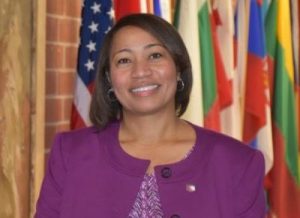Women leaders bring own styles to state’s colleges, universities
By Kevin Beese Staff Reporter and Holly Eitenmiller — October 30, 2019They have closed budget deficits, made program and staff changes, grown enrollment, opened additional campuses – and, in one case, even overseen a name change.
They are the women leading Illinois’ colleges and universities, oftentimes breaking the glass ceiling while putting their fingerprints on their respective campuses.
The most recent numbers from an American Council on Education survey reveals that just 30 percent of college presidents across the country are women and only 5 percent are women of color.
“It is disappointing that the percentage of women presidents is so low,” said South Suburban College President Lynette Stokes, who checks both survey boxes, “but it is like any other profession where women did not have a seat at the table.
“We have been breaking barriers in a profession that was male-dominated. I am proud to be part of that progressive change. We had a woman run for president of the United States. The mayor of Chicago is a woman. Things are going in the right direction,” she said.
Aurora University President Rebecca Sherrick has seen progress during her four decades of academic leadership, but notes that progress has been slow.
“It’s interesting because the majority of the students going to colleges and universities are women,” Sherrick said.
Few of the women leading Illinois’ college and universities ever envisioned being the top administrator at a campus as they were rising through the academic ranks.
Donna Carroll, who has been at the helm of Dominican University, formerly Rosary College, for 26 years, never expected to be leading the River Forest institution of higher education.
“If you would have asked this New York City girl who was born in Brooklyn if she would spend all her academic life at one Midwestern campus, the answer would have been ‘no,’” Carroll said.
For the 2004-05 school year, Lisa Freeman, who has led Northern Illinois University as its president for the past year, was an Ace fellow, the longest-running leadership development program in the United States for emerging college and university leaders.
“I felt well-prepared to be an academic leader. I thought I would stay on the research side and advanced to vice president of research (at NIU),” Freeman said, “but life happens. I became an executive vice president and provost, and then president. I get the best of both worlds.”
Most say there is no such thing as striking a happy medium between their leadership post and their family responsibilities.
“It’s hard. I’d be lying if I said being president is not a commitment,” Oakton Community College President Joianne Smith said. “My family has strongly supported me.”
“With college and family, there is no such thing as balance,” added Smith, who is married and has two teenagers at home. “There are days when the college gets most of my attention and there are days when family gets most of my attention. It goes day by day. My family knows there are times I am not going to be around because there is something big at the college.”
She said it not uncommon for her son to share his birthday celebration with a college event. Her children are part of the Oakton community, she said.
“They grew up here,” Smith said. “They went to the early childhood program.”
The women presidents feel their institutions are, in general, more collaborative in decision-making because they at the helm.
“I lead with more emotional intelligence, more empathy,” South Suburban’s Stokes said.
“In general, women are not as authoritarian,” Oakton’s Smith said.
Whether it is walking campus on a daily basis or having lunch with students, all of the women presidents say they make sure they interact with pupils on a regular basis
Dominican’s Carroll is on a first-name basis with students who will pop into her office taking advantage of the college president’s open-door policy.
“I don’t think a man would have the same style of leadership,” said Jessica Mackinnon, Dominican’s director of public information.
Even though their numbers continue to increase, women university and college presidents still catch some people off guard, as Aurora University’s Sherrick noted.
After a recent address to AU’s new freshman class, a female student came up to Sherrick to talk.
“She said, ‘I thought you’d be a man.’ I said, ‘I’m not.’ Then she asked, ‘Since you’re not a man, can I give you a hug?’”
Here is a look at some of the women leading Illinois universities and colleges:
Donna Carroll
Most university presidents do not give out their home telephone number to parents, but Dominican’s Donna Carroll is not most university presidents.
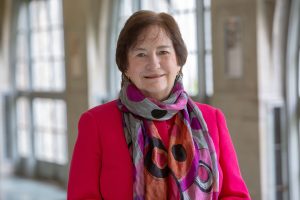
Donna Carroll has led Dominican University, formerly Rosary College, in River Forest for 26 years. (Dominican photo)
“It’s very personal. It goes to us being value-centered,” Carroll said of giving out her home number.
Carroll said she gets four or five calls at home a year from parents.
“They don’t abuse it,” Carroll said, noting that parents will use it when concerned about their child such as when a friend of theirs commits suicide.
In her 26th year at Dominican, Carroll is the first lay president of the Catholic university based in River Forest. In 1997, she led the academic community through a name change from Rosary College to Dominican.
“It’s an opportunity; it’s not a job,” Carroll said of her everyday enthusiasm for leading the institution of higher learning.
“But I don’t have 26 more years in me,” she laughed.
She noted that when she took over as Rosary president, she was one of the few women college presidents in the whole country.
Carroll said that once an individual reaches the pinnacle of being a college president, he or she needs to be focused on everything but himself or herself.
“You need to put your ego aside,” Carroll said. “The job is not about you.”
Carroll is an active voice for undocumented students. She noted that between 8 and 10 percent of Dominican’s enrollment is comprised of undocumented students.
She said supporting the undocumented students fits well into the university’s mission.
Lisa Freeman
After a year at the helm of Northern Illinois University, Lisa Freeman said one of the best parts of the job is the time she gets to spend talking with young people around the DeKalb campus.
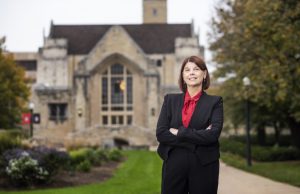
Lisa Freeman, president of Northern Illinois University for the past year, has been part of the DeKalb campus for nearly a decade. (NIU photo)
“I get to talk to people who are our future leaders,” Freeman said. “They have amazing hopes, dreams and aspirations. The more time I speak with them, the more hope I have for our future.”
Freeman has been a member of the NIU senior leadership team and a professor of biology since 2010. She served as NIU’s vice president for research and graduate studies from 2010-13 and became executive vice president and provost in 2014.
Being at the university before becoming its top administrator helped make for a seamless transition, according to Freeman.
“I was a Huskie before I was president so things were laid out,” Freeman said. “We had a shared vision.”
Freeman said she does not feel any extra pressure being Northern’s first female president, especially since she “came up through the ranks” at the DeKalb university. She said she doesn’t even notice gender when in university meetings.
“I like to tell people that I’m the first woman president at the school, but I am not going to be the last,” Freeman said. “… All presidents are under the microscope.”
Freeman said students, faculty and staff feel that she is approachable, but that “it is hard to tell what that is attributed to – me being a woman or having been at the institution.”
Georgia Nugent
The Illinois Wesleyan University Board appointed S. Georgia Nugent to serve as interim president, effective Aug. 15. Nugent will lead Illinois Wesleyan through the 2019-20 academic year while the university conducts a national search for its next president.
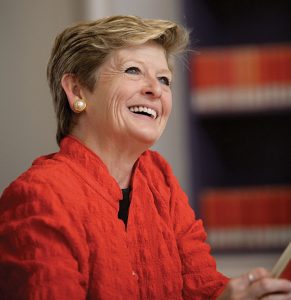
S. Georgia Nugent is the interim president at Illinois Wesleyan University in Bloomington. She will serve as interim president through this academic year
A published scholar of the classics and of higher education, Nugent earned a bachelor’s degree from Princeton University and a doctorate from Cornell University. Before beginning her decade-long presidency at Kenyon College, Nugent served at Princeton as assistant to the president, associate provost, and dean of the Center for Teaching and Learning, and as professor of classics at Princeton and Brown universities. She also taught on the classics faculties of Cornell as well as Swarthmore College and Kenyon.
Nugent later served as interim president at The College of Wooster during the 2015-16 academic year and is a fellow at the Council of Independent Colleges.
“I’m very excited to be joining the Illinois Wesleyan community and honored to have been chosen by the trustees,” Nugent said. “I have already had the opportunity to visit the beautiful Bloomington campus, to meet with a number of wonderful IWU people, and to hear from alumni about the difference this institution made in their lives. IWU is a strong university with, I believe, great potential for continued success. My goal during this academic year will be to work with the campus community to do all that we can to fully realize that potential, so that my successor will come to a campus that is proud of its past and well-positioned for its future.”
Rebecca Sherrick
Making fund-raising pitches to potential donors of Aurora University is something that Rebecca Sherrick took a while to get accustomed to doing.
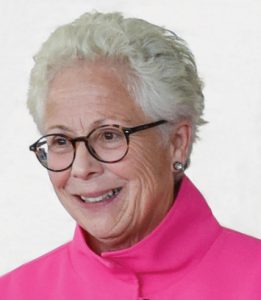
Rebecca Sherrick, president of Aurora University, has been in higher education leadership for 40 years. (AU photo)
“It does not come naturally to me. I am an introvert by nature,” Sherrick said. “I am most comfortable in my back yard with my dog gardening.”
Now Sherrick doesn’t give a second thought to the duty.
“Welcoming the community and talking about our mission is part of the job,” she said.
Sherrick became the 13th president of AU in 2000 after serving for 20 years as a faculty member and senior administrator at Carroll University in Waukesha, Wis.
She noted how one event can change the course of a university, citing the mass shooting that killed six people at the nearby Henry Pratt Co. plant in February.
“It dominated my life for six months,” Sherrick said.
The AU president said after the incident, the university did everything from ensuring that students felt safe on campus to re-evaluating its security policies to testing all of its security systems.
Sherrick said AU also running the George Williams College campus near Lake Geneva, Wis. creates its own unique circumstances.
“We have two campuses 80 miles apart,” Sherrick said. “To go up and back is four hours in the car.”
Sherrick said she tries to walk around the Aurora campus every day, talking with the students she encounters.
“It’s a real luxury I have,” Sherrick said, noting that she will pop in and watch classes in session while walking the campus.
Joianne Smith
Being a “trailing spouse,” Smith moved to the Chicago area when her husband got a job at Northwestern University in Evanston.
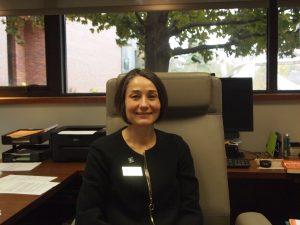
Joianne Smith has been the president of Oakton Community College is Des Plaines, since 2015. (Kevin Beese/Chronicle Media photo)
She spent a year as assistant director of university residence life at Northwestern and then joined the staff at Oakton Community College, first as dean of students and then vice president of student affairs. She has been Oakton’s president since 2015.
Smith points with pride to her “All for One” initiative at Oakton, which is intended to move the college forward in key student success metrics with the goal of improving fall-to-fall new student persistence.
“I believe in what we do as a local institution,” Smith said.
She said she tries to make the Oakton community a family.
“Oakton is about relationships,” Smith said.
Trying to ensure she connects with her own family every day, Smith makes sure to leave campus by 5:30 p.m. to have dinner with her husband and kids even if she is coming back to campus for an event that evening.
“They know the college is an important part of who I am,” Smith said.
She said helping ensure students get a strong education at the community college remains her top priority.
“Our students transfer seamlessly to Harvard, Yale, the University of Illinois,” Smith said. “By going to Oakton first, they can get a four-year degree at half the price.”
She noted that 70 percent of the school’s students are part time, meaning they are working while trying to advance their education.
Lynette Stokes
As South Suburban College’s first woman president in its 92-year history, Lynette Stokes knows that attention is on her.
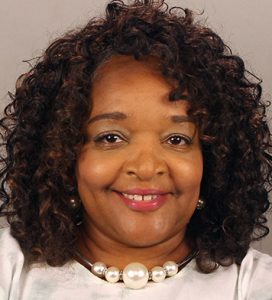
Lynette Stokes has been president of South Suburban College in South Holland since October 2018. (SSC photo)
“I feel some pressure. I feel I am under the microscope more as a woman than as a woman of color,” Stokes said. “I understand the significance of being a woman of color in this position. There is a different level of responsibility.”
Having worked in public service for nearly 24 years, Stokes has taught in elementary school and community colleges and worked for equal rights organizations. She was named president of the South Holland community college in October 2018.
“It was never in the game plan,” Stokes said of being a college president. “I started at City Colleges (of Chicago) and was there for 12 years on both the credit and non-credit side. It was a natural fit of my giving back to the community.”
Stokes said she does not see of any pecking order between two- and four-year schools on the higher education panel she is on with her peers.
“A president is a president is a president,” Stokes said.
She said research shows that the best-performing students at four-year schools are those individuals who started at community colleges.
Stokes said having one daughter and one granddaughter, her family obligations are not as heavy as her peers. She said that is good because the job can be all-consuming.
“It’s not a 9-to-5. It’s not 40 hours. You are on call 24 hours a day,” Stokes said. “You need to balance that.”
kbeese@chronicleillinois.com
Two presidents collaborate for shared future
By Holly Eitenmiller
For Chronicle Media
Before 2016 or so, the chance that Dr. Sheila Quirk-Bailey’s path might cross with Dr. Jamel Santa Cruz-Wright’s was pretty slim. Indeed, both women were blazing trails of their own, but when those trails finally converged, the two began making historic changes in higher education together.
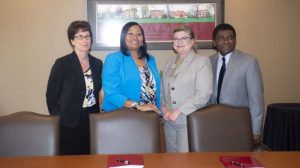
In August, Eureka College President Dr. Jamel Santa Cruz Wright, second from left, and Illinois Central College President, Dr. Sheila Quirk-Bailey, second from left, signed into a special partnership allowing ICC students with an associate degree to transfer Eureka College, in some cases, tuition-free. (Photo courtesy of Eureka College)
But not without changing histories on their own. In 2016, Bailey was chosen from a pool of applicants to serve as the president of Illinois Central College. The vetting process was a tough one for the presidential search committee, but on April 21 of that year, they voted unanimously in favor of Bailey and she became the first female president of ICC.
Less than three months later, Wright was named interim president of Eureka College but then that appointment that ended on June 30, 2017 when the board announced that she would become the college’s 27th president.
Wright not only became the private college’s first female president, she was its first African-American president.
“Part of my role, overall, came from a series of white papers a year prior to my coming,” Wright said. “We often talk about, at Eureka, the basis of those white papers, that we provide learning, service and leadership.”
The white papers became a map Wright followed that lead to the upending of the college’s general education curriculum. Wright, faculty and staff coordinated heavily to create 75 new courses, constructed around 10 essential skills.
“Five of those skills are what employers seek and five of them are what the world needs,” Wright said. “What the world needs is communication, intercultural understanding, communication, civic engagement and sustainability.”
Essentially, the new courses integrate those skills, creating an interdisciplinary experience. For example, Wright said biology professor Cecilia Hennessy offers a science class that focuses on race and class, and the socio-economics of sustainable practices.
“The goal is to gain a mastery in those foundational skills so that they can transfer those skills,” Wright said. “We know if you graduate with a degree in accounting, we know you know how to balance a spreadsheet. What companies have not been able to do, or have the resources to do, is to teach those foundational skills. Let’s sit you down and make sure you have a grasp of communication as more broadly defined.”
The key to overall success, Wright said, was partnering with Bailey to align the new curriculum with the needs of ICC students and the needs of the Peoria area.
“Dr. Quirk-Bailey really is a fantastic partner. We started as presidents about the same time, and we have a dynamic synergy,” Wright said. “She has made ICC one of the more premier colleges in the nation and blazed a whole new trail here.”
Upon assuming her presidency, Bailey placed, and kept, her finger on the pulse of Peoria, what was happening in the workforce and community.
“The four biggest gap areas are health care, manufacturing, information technology and education,” Bailey said. “There’s a huge teacher shortage in this area.”
Bailey then shifted the focus on providing “ladder” opportunities to students, ways for people to gain the additional credentials and education to earn living wages.
“’How I was going to make more students more successful?’ This is a big area of focus and it’s a big community need. That was something that hadn’t been the focus,” Bailey said. “When someone gets that credential that pays a living wage, it positively impacts their family; it grows the work force and it increases our regional economic viability.”
Examples of ladder opportunities include moving up from certified nursing assistant to licensed practical nurse, becoming a paramedic rather than remaining an EMT and gaining certifications in labor trades to move into supervisory positions.
As ICC began offering more opportunities in these areas, Eureka College followed suit. “We started, last year, on focusing specifically on the trades and construction,” Wright said.
On Aug. 8, the presidents met and signed into a special partnership to offer ICC students with an associate degree to gain their baccalaureate degrees at Eureka College in one of 30 academic or professional programs. This was the first agreement in the history of Eureka College to accept transfer of applied science credits.
The college now accepts associate degrees in law enforcement, drug and alcohol counselor training, accounting and numerous others. Through the Uniquely Eureka Promise, it’s possible for students to attend tuition-free.
“Working with Dr. Wright has been fantastic and we are absolutely thrilled to offer this opportunity with Eureka College,” Bailey said. “Representing the first as a female in any role is important because you want to be a role model and you want to have young women understand they can choose the life they want to lead and they can set their goals high.”

